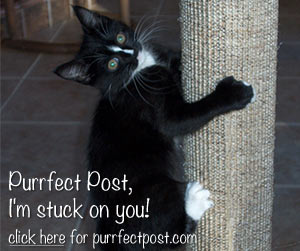5 Holiday Tips for Cats

The holidays bring changes to your home and lifestyle. Most cats have issues with any changes in their environment. From plants and tinsel, to guests and revelry, your cat will be affected by the holidays. Here are 5 holiday tips to keep your cat safe and your home in one piece.
Cats are a joy to have around, not just because of cuddles and purrs, but also because of all their mischief. We love playing with them and watching their adventures. These adventures can become dangerous, however, during the holidays as new home décor is displayed, piquing feline interest.
Your cat will also be affected by changes in your schedule. Cats prefer a consistent environment; knowing what is going to happen and when. As you attend more parties or have events at your home your cat's life will be totally disrupted, causing her to alter her own behavior patterns.
Holiday Tip for Cats #1: No Tinsel
Part of your holiday fun is decorating your home and Christmas tree. Many of us like to add garlands and other shiny decorations. These can be very attractive cats, especially if it tends to move; even the slightest bit. Cats are attracted to movement. It triggers their prey drive, which is very strong in felines. Tinsel can be very dangerous to cats. If ingested, it can cause blockages and prove fatal. You can learn more here: "The Dangers of Strings, Ribbons, and Yarn for Cats."
Instead of using tinsel garland or icicles use a thick, wide ribbon, or felt rings. While anything new is likely to intrigue your cat, using something your cat is less likely to digest will be safer. This also goes for gift wraps. Thin ribbons can be lots of fun for cats. Instead of the tinsel ribbons, stick with cloth or thick ribbons. These are less likely to be chewed and ingested. Spraying them with bitter apple spray will help prevent your gift wrappings from being destroyed.
Holiday Tip for Cats #2: Holiday Plants
It is common to add plants to your home during the holiday season. The most common plants are poinsettias, mistletoe, and holly. Not only can some of these plants prove poisonous, if ingested, they can make a huge mess if dug in and tipped over. If you must have the color and addition of holiday plants, use fake ones instead of real ones. You are the only person who will know the difference.
Your Christmas tree is an accident waiting to happen. There's lights, garlands, tree needles, ornaments and edibles. All of these can be dangerous to your cat.
- Tree stability - Make sure you use a long-legged, stable stand for your tree. Securing the tree via wire to the wall would be best, so that if your cat climbs the tree (cats love climbing trees), it is less likely to tip over.
- Tree toxicity - Ingesting tree needles can irritate your cat's mouth and digestive system. You can spray your tree with bitter apple spray or another product that makes the tree taste bad to cats in order to prevent your cat chewing on it.
- Tree décor - Tinsel, garland, and decorations are very attractive to cats. If eaten, they can cause blockages which require surgery. It's best to leave these off the tree. Glass ornaments can also be attractive as they reflect light. If played with they can fall and break, pieces cutting your cat's sensitive paws. It's best to not use glass ornaments. Also avoid angel hair and fake snow. These can also be harmful if ingested. And, very important, do not use edible decorations on your tree. chocolate is highly toxic to cats and the wrong types of foods, especially carbohydrates, can disrupt your feline's digestive system.
- Electric lighting - Lights are very attractive to cats. Not just their being unique to your home, but also the long cords and shiny bulbs. There are numerous dangers to cats with electric lighting; from burned mouths to electrical shock. It's best to cover the cords with PVC conduit, or spray them with bitter apple spray.
- Live tree - Live trees are the ultimate in holiday décor as they are not only beautiful but also have a wonderful scent. Keeping them preserved is often a challenge and requires water in the stand as well as chemicals and flame retardants. Cats don't know the difference between their usual water dish and one that happens to be beneath a tree. To avoid your cat ingesting all of these harmful chemicals keep the tree stand cat proofed. You can always cover it with a tree skirt to hide any pet proofing apparatus.
Holiday Tip for Cats #3: Holiday Parties
Cats love to frolic, but they rarely enjoy loud parties. In fact, most will run and hide because all the noise and activity can be frightening. It not only disrupts their quiet home, but there are also people coming into your house that they don't recognize.
While some cats are curious about new people, most cats will hide when a new person enters your home. This disruption can cause your cat to change her own behavior patterns such as not eating, not using her litter box or becoming aggressive. It is best to place your cat in a quiet room where she will not be bothered. Put her water and food dishes in the room along with a clean litter box. If your cat has a favorite blanket or bed place that in the room as well. It would also be helpful to place a Feline Appeasing Pheromone (Feliway) diffuser in an outlet of the room. This will offer your cat a recognizable smell which will aid in her relaxation.
Make sure all visitors are aware of your cat. Some people are allergic to cat dander. A home with cats will have hair and dander everywhere no matter how meticulous you are about cleaning. Also make certain that your guests do not go into your cat's quiet room. This can disturb your cat and also risk her escaping into other areas of the house or even outdoors as guests come and go.
Holiday Tip for Cats #4: Pet Guests
Cats are rarely welcoming of strange cats, dogs and other new pets. The last thing you should do on a holiday is to bring home another pet or have a guest bring their own into your home. Cats are very territorial. While dogs will normally welcome a new canine guest and be happy to chase a new feline guest, your cat will merely become stressed out by the newcomer. Stressed cats act out by marking their territory in places other than their cat box, being destructive, loud vocalizations or sudden aggression. Even if you keep the new pet separated from your cat she can still smell and otherwise sense that there is an interloper in her territory.
With all the other unique events associated with this time of year you would be advised to not add this into the mix. Once a cat begins marking territory it is difficult to stop. And, once a cat develops bad behavior it will take much time and effort to overcome.
Holiday Tip for Cats #5: Great Feline Gifts
Even if your cat cannot enjoy parties and festivities, she can still partake in gifting and whatever extra time you can offer to interact. There are many great interactive cat toys available. Those where your feline can play on her own or with you.
Here's a list of safe and fun toys you can give your cat this holiday season:
- Soft catnip- or honeysuckle-filled toys
- Scratching pads and posts
- Cat trees made of sisal
- Interactive toys
Being the human companion of a cat can sometimes be challenging, but well worth it when they cuddle and purr at your side and entertain you performing somersaults in the air when playing with a toy. Following these 5 holiday tips will help insure your cat's safety and enjoyment of the holiday season.
You May Also Like These Articles:
The Dangers of Strings, Ribbons, and Yarn for Cats
Foods Toxic to Cats - Slideshow
Common Plants Poisonous to Cats
Feliway - A Useful Tool to Help Treat Stress in Cats
Best Holiday Gifts for Cats and Those Who Love Them
Easter Lilies: A Holiday Hazard for Cats
Notice: Ask-a-Vet is an affiliated service for those who wish to speak with a veterinary professional about their pet's specific condition. Initially, a bot will ask questions to determine the general nature of your concern. Then, you will be transferred to a human. There is a charge for the service if you choose to connect to a veterinarian. Ask-a-Vet is not manned by the staff or owners of CatHealth.com, and the advice given should not delay or replace a visit to your veterinarian.






